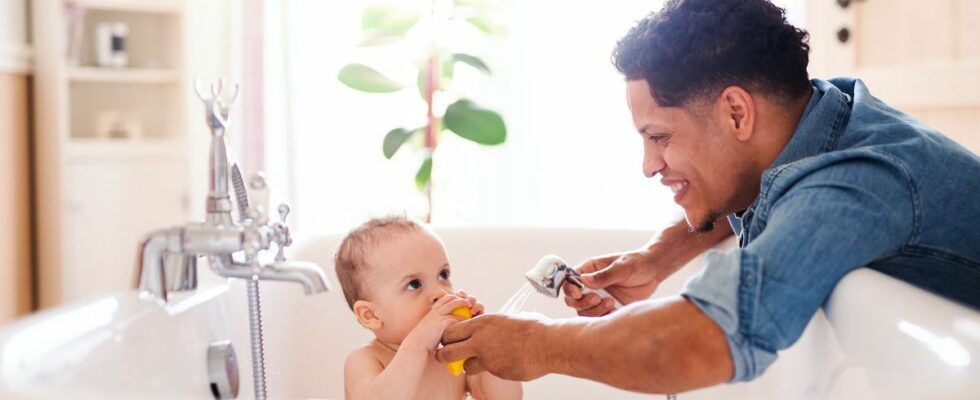Published on
Updated
Reading 3 min.
“Praising” a dad for knowing how to change a child’s diapers or doing homework can seem positive. It’s actually another way of highlighting the difference in what is expected of fathers and mothers without really changing mentalities on the subject.
“You’re lucky with Laurent, he helps you a lot with the baby and he even acts as a babysitter!” These remarks, said in a tone of admiration, however, leave a bitter feeling when you are a woman: certainly, it is good to have a child with an involved dad, but should he still be made a hero when he plays his part? role ?
This “dad blessing” that pushes women a little deeper
This clapping is what is commonly called “dad blessing”, a behavior that is more toxic than it seems. For what ? Because it highlights the difference in treatment reserved for fathers and mothers: whether they work or not, women generally inherit the responsibility of caring and making the whole family happy by donning their perfect mother’s cape along the way, when men are supposedly ill-equipped for everyday tasks. The slightest diaper changed would therefore be part of the “extra” thing that they manage to do (wow!)
Despite an evolution in dads (who are more involved than previous generations) let’s still remember that mothers are always more expected at the turn. As sociologist Illana Weizman reveals in the media Parents.fr:
“If fathers do stupid things with their children, it’s comical or cute. If a mother makes the slightest deviation, it’s seen as a failure.”
The other problem with dad blessing is that it also finds its way into the professional world, penalizing mothers there too. Thus, after having benefited from a longer leave than the father, the mother, already away from the professional world for a longer time, is often the one who adapts her schedule to absences (sick child, etc.) But if this is perceived as normal for society, a father who takes leave for a sick child is now valued. In what capacity?
New fathers, a beautiful image that should not be satisfied
The sociologist also warns: this image of new dads can also be misleading. Thus, we readily praise fathers who are more involved, but in reality, change is long overdue. Concretely, today only 35% of parental tasks on average are taken care of by fathers within heterosexual couples (and these are often the most rewarding, not making appointments, etc.).
“These fathers are unicorns, not at all representative of the social class of fathers. Taking parental leave is not the norm, so we should not focus on them” she maintains.
Furthermore, for a father who plays with his daughter, who takes care of his baby or gets involved in his elder’s duties, who is the parent who thought about medical appointments, who went to the pharmacy, has Looking for a nanny or making an appointment with the teacher? Mothers, most often. The mental load is still far from being shared.
What if we stopped complimenting normal behavior?
Why not compliment women more, then, for all their efforts? While a “mum blessing” would be welcome, the sociologist sets the record straight:
“The solution is not there, but in the equitable distribution of tasks. We should no longer have to be praised or criticized, but it should just be normal for everyone to share everything. We will then live our lives more peacefully. maternity wards”, she maintains.
The best way to thank a mother for everything she does to support her family is not to applaud her. Nor changing a diaper as a gift of self. But to do as much as her, without waiting for a shower of compliments.

